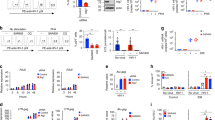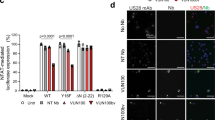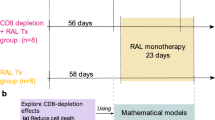Abstract
Natural human interferon beta (beta-IFN) was tested during the early phase of in vitro infection with HTLV-I virus of human cord blood mononuclear cells (CBL), to evaluate whether its antiviral and immunomodulating effects might prevent spreading of infection in the host. beta-IFN was found to reduce HTLV-I transmission and integration in CBL cultures. Moreover, beta-IFN had no effect in preventing virus transmission and integration in K562 and a very limited effect in HL60 and Molt-4 human tumour lines, suggesting a cell-type specific mode of action. beta-IFN induced a 'priming' response on CBL, since overnight pretreatment of recipient cells or one single treatment at the onset of the coculture were almost equally effective in protecting against HTLV-I infection. During the early days post infection (p.i.), IFN-treated CBL showed a pattern of phenotypic markers that was closer to that of non-infected CBL. In contrast, untreated CBL exposed to HTLV-I showed a percent increase of Tac+, M3+ and Leu 11+ subpopulations. Cell-mediated immune responses of CBL were depressed after coculturing with HTLV-I producer MT-2 cells. beta-IFN was able to boost the cell-mediated cytotoxicity of fresh and infected CBL against both K562 and MT-2 target cells. Leukocyte blastogenesis in mixed lymphocyte/tumour cell cultures, evaluated in terms of 3H-thymidine incorporation during the first week p.i., was also enhanced by IFN when macrophages and lymphocytes were reconstituted at an optimal 1:20 ratio. It is conceivable that this overall enhancement of the immune response induced by beta-IFN could contribute to reduce HTLV-I infection in vitro.
This is a preview of subscription content, access via your institution
Access options
Subscribe to this journal
Receive 24 print issues and online access
$259.00 per year
only $10.79 per issue
Buy this article
- Purchase on Springer Link
- Instant access to full article PDF
Prices may be subject to local taxes which are calculated during checkout
Similar content being viewed by others
Author information
Authors and Affiliations
Rights and permissions
About this article
Cite this article
D'Onofrio, C., Perno, C., Mazzetti, P. et al. Depression of early phase of HTLV-I infection in vitro mediated by human beta-interferon. Br J Cancer 57, 481–488 (1988). https://doi.org/10.1038/bjc.1988.111
Issue Date:
DOI: https://doi.org/10.1038/bjc.1988.111
This article is cited by
-
CD80+ and CD86+B cells as biomarkers and possible therapeutic targets in HTLV-1 associated myelopathy/tropical spastic paraparesis and multiple sclerosis
Journal of Neuroinflammation (2014)
-
Protective effect of interferon ? on human T cell leukaemia virus type I infection of CD4+ T cells isolated from human cord blood
Cancer Immunology Immunotherapy (1993)
-
Modulation of the cell-mediated immune function by interferon α, β or γ can partially reverse the immunosuppression induced by human T-cell leukemia virus I in human cord blood cultures
Cancer Immunology Immunotherapy (1990)
-
Suppressive effects of interferons on the production and release of human T-lymphotropic virus type-I (HTLV-I)
Archives of Virology (1990)



